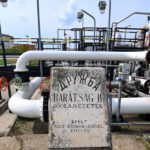Two mid-scale Russian liquefied natural gas plants on the Baltic Sea appear to completely halt loading operations ahead of a 27 February deadline imposed as part of sanctions authorised in January by the administration of former US President Joe Biden.
Maritime shipping data suggests that the Russia-registered LNG carriers Pskov and Veliky Novgorod, which have previously shipped gas from the Portovaya LNG project, remained at anchor in the Gulf of Finland throughout the second half of February.
Portovaya LNG has an annual production capacity of 1.5 million tonnes and operates an LNG loading terminal near the Russian border with Finland.
The facility is operated by Russian state-run gas giant Gazprom, which also has a 50% holding in the plant via an investment affiliate.
Veteran project specialist and independent industry consultant Ben Seligman said in a social network post on Friday that Pskov — which was recently renamed Pearl — loaded an LNG cargo from Portovaya due for delivery to China earlier in February, however, the carrier has never left for its final destination.
Seligman said that he has not seen any other LNG carriers berthing at the Portovaya LNG or Vysotsk LNG projects within the last two weeks in order to load gas cargoes.
Vysotsk LNG, which can produce up to 700,000 tonnes of LNG per year, is owned by a joint venture of Russia’s largest independent gas producer Novatek and country’s leading financial institution, Gazprombank. It is located about 13 kilometres from the Russian city of Vyborg.
Europe is the target market for both facilities, with LNG from Vysotsk often supplied to Finland, Baltic countries and Belgium. Cargoes from Portovaya are frequently shipped to Greece and Spain, according to marine traffic data.
On 10 January, the US Department of State sanctioned both plants as part of wider efforts to target the revenue Russia generates from LNG exports which can be used to fund its war in Ukraine.
The department told companies dealing with the plants to stop doing business with Portovaya and Vysotsk by 27 February.
Seligman noted that latest Russian LNG production figures released by the country’s state statistical agency Rosstat earlier this month showed the country produced a total of 3 million tonnes of LNG in January, about 6.5% less than in December 2024.
The decrease may be due to the consequences of US sanctions, Seligman said.
Upstream has contacted Gazprom and Novatek for comment.












